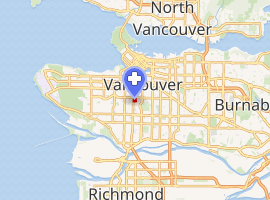G. F. Strong Centre
GF Strong Rehabilitation Centre is the largest rehabilitation hospital in British Columbia.[1] It is located in the South Cambie neighborhood of Vancouver.
| G. F. Strong Rehabilitation Centre | |
|---|---|
| GF Strong Rehabilitation Centre | |

| |
| Geography | |
| Location | Vancouver, Vancouver Fairview, British Columbia, Canada |
| Coordinates | 49°14′50″N 123°07′33″W |
| Organization | |
| Care system | Public Medicare (Canada) (MSP) |
| Type | Rehabilitation Centre |
| Affiliated university | University of British Columbia |
| Services | |
| Beds | 83 |
| History | |
| Opened | 1949 |
| Links | |
| Website | http://www.vch.ca/Locations-Services/result?res_id=1277 |
| Lists | Hospitals in Canada |
It provides inpatient (overnight stays), outpatient, outreach and clinical support services to clients/patients across British Columbia and the Yukon in four unique programs: Acquired Brain Injury, Spinal Cord Injury, Arthritis and Neuromusculoskeletal. It also has specialized programs for adolescents and young adults. Health care professionals such as physiotherapists and physiatrists deliver individually tailored treatment for people with the most serious and complex injuries and illnesses requiring rehabilitation.[2]
History
Following World War II, there was a large influx of soldiers returning to Canada with permanent disabilities, and there was no facility located in British Columbia to accommodate their needs. Dr. George Frederick Strong was a strong advocate for the building of a rehabilitation centre in BC after his daughter sustained a spinal cord injury. Dr. Strong joined with the Western Division of the Paraplegic Association to realise his dream. GF Strong Rehabilitation Centre opened in 1949, and has since grown in size and scope, treating patients from through BC and the Yukon. [3]
Patient services
Acquired brain injuries
Provides in and outpatient services, and community support to adult patients who have sustained a brain injury.[4]
Spinal cord injury
The program has a 29-bed inpatient program, as well as outpatient support for people living in the community. The program encourages patients to realize their abilities and set goals towards rehabilitation.[5]
Arthritis
This program is offered for patients who have been diagnosed with systemic inflammatory rheumatic diseases and/or associated reconstructive surgery. 55% of patients enter the program following reconstructive surgery. Patients are treated by interdisciplinary teams of rheumatologists, nurses, physical and occupational therapists, and social workers.[6]
To be admitted to the program patients must
- Have a diagnosis of rheumatic disease or related reconstructive surgery
- Be medically stable
- Have sufficient cognition, motivation and endurance adequate to benefit from active rehabilitation
- Have goals for rehabilitation
- Be over 16 years of age.[6]
Neuromusculoskeletal
The neuromusculoskeletal program offers treatment to patients suffering from Neuromuscular Disease, Polio, Burns, Complex Trauma, Multiple Sclerosis, Cerebral Palsy, Cancer, Amputation and Neurodegenerative Diseases. A team put together to treat patients in this program may include Occupational Therapists, Physiatrists, Physiotherapists, Social Workers and Speech Language Pathologists depending on the patients needs.[7]
Whether it is following a catastrophic injury or degenerative condition such as ALS, Multiple Sclerosis or Parkinson's Disease, patients receive intensive treatment and counselling so they can regain as much essential functioning as possible or learn how to best manage and cope with any remaining disabilities.
Affiliations
GF Strong Rehabilitation Centre provides a broad range of clinical services, including specialized care at Mary Pack Arthritis Centre. Through its affiliation with the University of British Columbia and other academic organizations, GF Strong Rehabilitation Centre in leading rehabilitation teaching and research. Some of its clinical programs include Alcohol & Drug, Amputee Team, Orthotics and Sexual Health. [8] [9] [10] [11]
Facts and figures
- 83 inpatient beds
- 600 inpatient admissions per year
- 1,600 clinic visits per year
- 550 employees
Contact information
4255 Laurel St. Vancouver, BC, V5Z 2G9 Tel: 604.734.1313 Fax: 604.737.6359
References
- "Archived copy". Archived from the original on 2011-07-16. Retrieved 2011-07-16.CS1 maint: archived copy as title (link)
- http://www.vch.ca/gfstrong
- "Archived copy". Archived from the original on 2009-03-02. Retrieved 2009-03-22.CS1 maint: archived copy as title (link)
- "Archived copy". Archived from the original on 2009-03-03. Retrieved 2009-03-22.CS1 maint: archived copy as title (link)
- "Archived copy". Archived from the original on 2009-03-03. Retrieved 2009-03-22.CS1 maint: archived copy as title (link)
- "Archived copy". Archived from the original on 2009-03-03. Retrieved 2009-03-22.CS1 maint: archived copy as title (link)
- "Archived copy". Archived from the original on 2009-03-03. Retrieved 2009-03-22.CS1 maint: archived copy as title (link)
- "Archived copy". Archived from the original on 2009-05-04. Retrieved 2009-08-28.CS1 maint: archived copy as title (link)
- "Archived copy". Archived from the original on 2008-04-22. Retrieved 2009-08-28.CS1 maint: archived copy as title (link)
- "Archived copy". Archived from the original on 2007-11-08. Retrieved 2009-08-28.CS1 maint: archived copy as title (link)
- http://www.vch.ca/abi/docs/sexualhealthServiceBrochure2004.pdf%5B%5D
- Vancouver Acute Administration, Vancouver Coastal Health, 2009